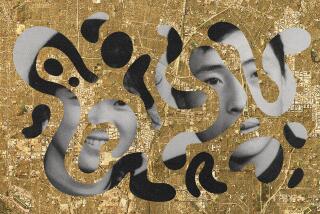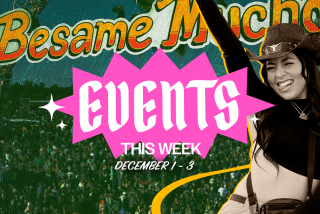West Meets East at Fete Marking Birth of Buddha
- Share via
Fragile, tinkling Oriental music blended with savory smells of fresh-cooked teriyaki and won ton.
Ladies in kimonos formally bowed as they served tea.
Children, carefully watching their instructors, gave exhibitions of kendo, a martial arts skill.
It might have been Tokyo. But the colorful activity, which drew about 10,000 visitors over the weekend, was in the heart of Anaheim. The Orange County Buddhist Church at 909 S. Dale St. celebrated the birth of Buddha with a traditional Hanamatsuri Bazaar and Program on Saturday and Sunday.
The event, also called a “flower festival,” occupied the parklike grounds of the church and its adjacent buildings. Asian-Americans from all over California flocked there to celebrate age-old traditions. Thousands of non-Asians came as visitors, sampling the exotic foods, seeing the cultural exhibitions and shopping at the booths.
Sushi and Kushi Katsu
America’s remarkable blend of people showed itself in the happy faces celebrating the birth of Buddha more than 2,500 years ago. Anglos and Latinos stood in lines to buy meals of sushi and kushi katsu. Asian-American faces behind the booths smiled and welcomed the visitors.
Some of the stalls showed the mix of Eastern and Western cultures: one could buy corn on the cob at one booth and something called a Teri-Burger at another.
While the festival emphasized Oriental traditions and cultures, American patriotism welled deeply. In one corner of the busy exhibit grounds, a Japanese-American couple, Francis and Shizuka Watari of Costa Mesa, admired the bonsai exhibit and quietly talked of their love of the United States. Although initially reluctant to be interviewed, with persuasion they related their memories of a controversial chapter of American history: the sending of Japanese-Americans to concentration camps during World War II.
“We both were born in the United States, and we lived here all our lives, except when we were sent to the camp in Arkansas during the war,” said Francis Watari, 72. “In those days, signs were placed on the streets saying that you must turn yourself in. If you did not, the FBI came looking for you.”
Japanese-Americans in those days were suspect simply because of their race: no act of disloyalty ever was proved during the California roundup early in 1942. An embarrassed Congress has in subsequent years frequently acknowledged that the internment of the Japanese-Americans from the West Coast was a shameful mistake.
But Francis and Shizuka Watari said in the interview Sunday that they hold no bitterness. “This is the country I was born in,” said Francis Watari. His wife added that the experience was not all bad. “We saw some of the country we had never seen before,” she said.
Hard to Get Work
Francis Watari said there was some difficulty in getting a job after he and his wife returned to California. “Before I was sent to Arkansas, I had been working in a produce market,” he said. “When I came back to California, it was hard for an Asian-American to get a job. The only thing people wanted was an Asian gardener. So I became a landscape gardener.
“My wife even enrolled me in a bonsai class, and I learned that. I joked with her that when I started, the only flower I knew was a cauliflower. But I learned bonsai and landscape gardening.”
The United States, they said, is still the land of opportunity, and they showed off one of Francis Watari’s bonsai exhibits at the festival. They smiled at each other as they recalled how he went into gardening simply because other Americans expected all Japanese to be good at it.
A few feet away, an immigrant family from South America, Liliana and Enrique Pilozo, showed their children some of the colorful fish swimming in one of the exhibition tanks. “I’m from Ecuador, and my wife is from Colombia, but our two children were born here in America,” said Enrique Pilozo. “We come to this festival every year.”
Like so many others in the big crowd, the Pilozos, who now live in Stanton, said they enjoyed and admired the Oriental culture on display.
And the Rev. Satushi Hirati, minister of the 700-member Orange County Buddhist Church, said that all in the big crowd were welcome. “We have all kinds of exhibits and demonstrations,” he said. “We just celebrate and enjoy this festival.”
More to Read
Sign up for The Wild
We’ll help you find the best places to hike, bike and run, as well as the perfect silent spots for meditation and yoga.
You may occasionally receive promotional content from the Los Angeles Times.






